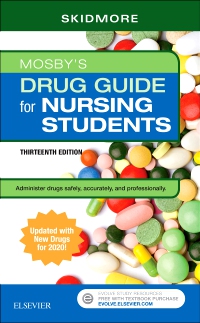
Mosby's Drug Guide for Nursing Students with 2020 Update Elsevier eBook on VitalSource, 13th Edition
Elsevier eBook on VitalSource

Now $36.09
From the most-trusted name in nursing comes the handbook designed to help you understand common drug families and interactions. Mosby’s Drug Guide for Nursing Students with 2020 Update provides you with the latest information on more than 4,000 generic and trade name drugs, along with a 2020 update to the latest FDA-approved medications. Side-effects are organized by body system and identified as common or life threatening, informing you what signs to watch for during assessments. In addition, drug monographs are arranged alphabetically, and each includes clear dosing, administration, and nursing process information, so you are ready for clinicals. In fact, what sets this handbook apart is its detailed coverage of rationales and explanations, drug-specific nursing diagnoses, administration of IV drugs, and medication safety - helping you to understand how families of drugs work together.
-
- More than 4,000 generic and trade-name drugs are profiled, covering almost every drug you will administer in practice or in clinicals.
- Black Box Warnings provide alerts to FDA warnings of dangerous or life-threatening drug reactions.
- Safety Alert icon highlights the most critical drug interactions and side effects.
- Bold headings in coverage of IV drug administration highlights dosage and IV administration instructions, including safety considerations, syringe, and additive compatibilities.
- Logical organization of side effects information show you what signs to watch for during assessments.
- Nursing Process steps are used as the framework for organizing all nursing care information.
- Alphabetical organization by generic name provides quick and easy access to specific drugs, and a full-color design highlights important information.
- Complete pharmacokinetic information includes the mechanism and absorption of the drug as well as its action, duration, and excretion.
- Cross-references indicate drug information that may be found in the appendixes.
-
- NEW! The most up-to-date information on drug dosage, warnings, and patient information ensures you understand the safe administration of common classes of drugs, as well as their common side effects and interactions.
-
Drug categories Alpha-adrenergic blockersAnesthetics--general/localAntacidsAnti-alzheimer agentsAntianginalsAntianxiety agentsAntiasthmaticsAnticholinergicsAnticoagulantsAnticonvulsantsAntidepressantsAntidiabeticsAntidiarrhealsAntidysrhythmicsAntiemeticsAntifungals (systemic)AntihistaminesAntihypertensivesAntiinfectivesAntilipidemicsAntineoplasticsAntiparkinson agentsAntiplateletsAntipsychoticsAntipyreticsAntiretroviralsAntitubercularsAntitussives/expectorantsAntiviralsBeta-adrenergic blockersBone resorption inhibitorsCalcium channel blockersCardiac glycosidesCholinergicsCholinergic blockersCorticosteroidsDiureticsHistamine H2 antagonistsImmunosuppressantsLaxativesNeuromuscular blocking agentsNonsteroidal antiinflammatoriesOpioid analgesicsSalicylatesSedatives/hypnoticsSkeletal muscle relaxantsThrombolyticsThyroid hormonesVasodilatorsVitamins
Individual drugs in A-Z Format AppendicesA. Selected new drugs B. Recent FDA drug approvalsC. Ophthalmic, otic, nasal, and topical productsD. Vaccines and toxoidsE. Antitoxins and antiveninsF. Herbal productsG. Combination productsH. Medications that may be inappropriate for geriatric patientsI. Drugs metabolized by known P450’sJ. Safety in handling chemotherapeutic agentsK. High-alert drugsL. Controlled substance chartM. Immunization schedules for children and adolescentsN. High-alert Canadian medicationsO. Canadian controlled substance chartP. Canadian recommended immunization schedules for infants and childrenQ. FDA pregnancy categoriesR. Weights and equivalentsS. Abbreviations